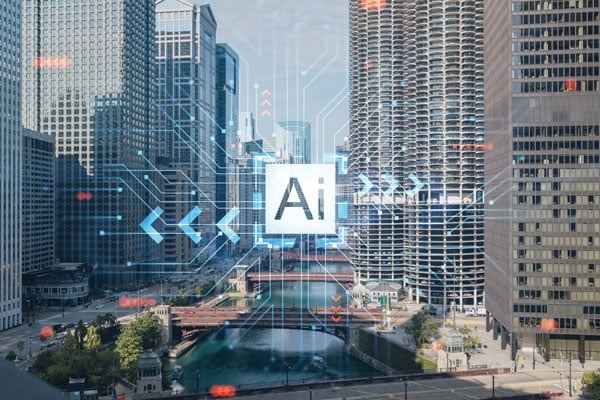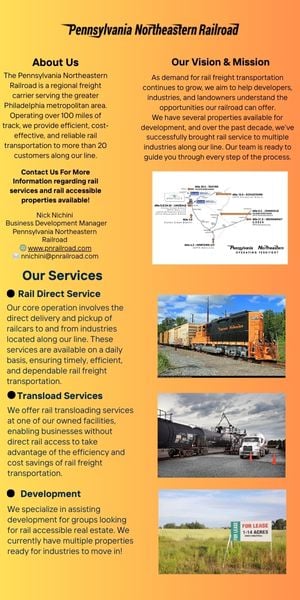
Navigating the AI Revolution: A Blueprint for Real Estate Executives
While artificial intelligence reshapes industries globally, commercial real estate is at a crossroads of adapting swiftly or being left behind.
As sectors from health care to finance experience the transformative power of artificial intelligence, commercial real estate treads with caution. Conversations within the industry reflect an understanding of AI’s theoretical benefits, but there’s a hesitancy toward implementation. Commercial real estate, anchored in tangible assets and direct interactions, now faces the challenge of a digital revolution.
Traditional methods of running a real estate company and the aspects of underwriting, conducting due diligence, running property management and sourcing deals have all been manual and people-focused processes. More volume usually meant more employees. When growing a real estate business, executives chose to hire more analysts, junior property managers, and back-office accounting and finance. CRE’s aversion to the adoption of technology and automation has not necessarily been due to distrust but rather to real estate’s strong history of being a people-first industry.

AI promises to reshape CRE careers. Khanchit Khirisutchalual via iStock/Getty Images Plus
However, thanks to the widespread adoption of computers, increased internet connectivity and changes brought on by COVID, the embrace of technology among all companies, including those in real estate, has taken a quantum leap forward. Whereas companies previously required employees to be physically at the office, remote work policies have paved the way for the widespread implementation of new technology. BIM systems have replaced the architectural plan room. Deal management software such as Dealpath and VTS has helped organize the deal pipeline and the leasing cycle. Customer relationship management systems have replaced the Rolodex. The acceptance of modern computer applications now smooths the path for the next step: AI.
AI History and Terminology
AI started primarily as an academic field focused within the disciplines of computer science. In the 1950s, pioneers including John McCarthy, Marvin Minsky, Nathaniel Rochester, Claude Shannon and Alan Turing deduced that human intelligence could be simulated, giving rise to the study and development of AI. Over the following decades, research developed many fields within AI, leading to significant breakthroughs in modeling and mimicking human intelligence and thought.
Recent advances in large language models (LLMs), processing power and consumer-facing software have enabled widespread adoption of AI for public use. In November 2022, OpenAI released its chatbot to the public, and it took the world by storm. Suddenly, the public was able to ask its chatbot, ChatGPT, any question, and it would deliver a coherent, helpful response, allowing the world to experience firsthand the power of AI. Other chatbots, including Microsoft’s Bing Chat, Google’s Bard and Anthropic’s Claude, soon entered the field.
Amplifying Employee Productivity
The primary and most immediate introduction of AI into the commercial real estate industry will involve individuals. The early stages of consumer-facing AI applications have already shown extraordinary opportunities for executives and employees to work more efficiently.

Those who learn about AI now stand to benefit in the long run. iStock/Getty Images Plus
The growth and advancement of LLMs through consumer- and business-facing software have rapidly allowed individuals to scale their personal productivity. The work that previously would have taken an employee hours to complete now takes minutes. Similar to how Lotus 1-2-3 and Microsoft Excel revolutionized the private equity and CRE industries, chatbots possess the ability to greatly increase the productivity of employees. A September 2023 Harvard Business School study found that consultants using AI completed 12.2% more tasks on average and produced 40% higher quality work compared with a control group.
Computer programmers, typically with specialized knowledge and years of training, now can use automated tools to write code instead of writing it themselves. Hiring professional photographers is no longer always needed because AI tools can generate realistic photoshoots instantaneously. Marketing materials can be enhanced by well-trained users of chatbots.
Harnessing Data: AI-Driven Knowledge Management in CRE
CRE companies can use AI to better automate, illuminate and analyze proprietary data that was once embedded in individual workflows. Typically, CRE firms amass vast amounts of data about their properties, tenants and operations, typically in legacy systems or unorganized document storage. By using the power of LLMs, CRE companies will be able to find, organize and analyze vastly more data than previously was possible. For example, new applications using LLMs can scan, read and analyze 1,000-page PDFs such as limited partnership (LP) agreements or commercial leases and then draw conclusions about the relevant data. Curious about the option language in a lease or need a summary of the fees in your LP agreement? Ask your chatbot.
In addition, vast data sets inside enterprise resource planning systems, comparables databases and leasing software provide unique opportunities for LLMs to query, evaluate and draw conclusions on existing proprietary data. Microsoft’s new AI suite, Copilot, can analyze an entire company’s data and files to generate relevant knowledge for executives seeking information from disparate sources across the business.
Forward-thinking real estate companies have already included AI in their businesses. “Artificial intelligence has unveiled approaches that increased our knowledge of an asset class that was previously uncharted,” said Ryan Elazari, senior director with Empire Management. “The newfound insights fuel our pursuit of prospective acquisitions and prepare us to make smarter investment choices.”
Beyond Today: Speculating on AI’s Future Role in Real Estate
Beyond existing personal and company-wide implementations of LLMs, the modern real estate business will continue to advance past current chatbot implementations. Technological advances and startups will soon harness and effectively deploy AI for uses specific to real estate. AI will be involved in various stages of the investment process such as deal sourcing, asset management, leasing, site design, relationship management, sales and investment decisions. Guy Zipori, co-founder of Skyline AI (acquired by JLL), said in a 2019 Forbes article, “As AI infiltrates more aspects of business, commercial real estate investors will come to expect that AI solutions are implemented to yield more precise decision-making. Each deal will still involve its own element of art — but investors stand to win from bringing some data science to the process.”
Some Current Chatbot and Image Creation Tools
|
A real estate company is in the business of acquiring, entitling, developing, leasing and managing real estate investments. How will AI affect these individual steps? Sean Ward, executive vice president at CBRE, believes the impact cannot be underestimated, especially in brokerage. “Think of the amount of time an analyst spends underwriting a deal: the financial model, the comp/data set, comparing debt structures, and so forth. AI will analyze [that] in seconds. The appraisal business, lease administration, property management … all will be completely changed by AI.” Ward doesn’t believe this spells doom for employees, but he cautions that as in every other industry, the companies that figure it out first will put themselves far ahead of the pack. “The companies that avoid or lag will be forced to play catch-up or will cease to be relevant,” Ward said.
Navigating the AI Era: Opportunities for CRE Professionals
As students and employees consider their own career growth, many are questioning what skills and values they should focus on to both harness AI’s power and protect themselves from becoming redundant. According to Scott Dunphy, portfolio manager at MetLife, investing personally in AI leverages success in his career and ensures that he isn’t left behind. “I want to be at the forefront of AI change,” he said. “Instead of being replaced by AI because I ignored it, I want to be the most involved and driving its adoption.” Dunphy, an ex-Silicon Valley engineer turned real estate professional, now actively takes part in senior management’s decision-making on AI adoption.
Similarly, Lindsey Burke, investor at Greenpoint Ventures, saw the mass adoption of technology in CRE, including AI, as a way to advance her career at Blackstone. Now as a venture capital investor focusing on real estate technology companies, she sees opportunities for eager employees to combine their real estate and technology acumen. “The real estate industry is positioning itself to absorb AI talent that Big Tech is shedding amidst marketwide layoffs,” said Burke. Operating companies will be able to improve productivity by implementing basic and free automation modules that were previously available only to trained engineers. Burke expects to see “a significant spike in innovation across real estate, including in infrastructure that supports in-field AI needs specific to real assets.”

AI-backed business decisions will become routine if not expected. 2d illustrations and photos via iStock/Getty Images Plus
AI will be a critical skillset for all employees eventually, and those first movers will likely have a significant advantage as AI becomes more widely adopted. “Every real estate professional will need to know, understand and invest in AI in a significant way,” Elazari emphasized. “There is an opportunity to reimagine different functions in the real estate business, such as customer service in sales and property management, and gathering market insights and trends data to achieve operational efficiency.”
Reimagining Real Estate: AI’s Impact on the Built Environment
As AI finds its way into various industries and consumer habits, it’s not just affecting the internal dynamics of real estate operations but also altering the physical landscapes of our cities and communities. The infrastructures, designs and purposes of buildings and spaces will evolve in response to the rise of AI technologies. In the same way that the adoption of many innovative technologies of the past (cars, e-commerce, skyscraper design, modern manufacturing) brought about new types and designs of real estate, AI stands to make a significant impact on the broader economy and the built environment.
Widespread AI adoption is likely to influence changes in global infrastructure, including power, fiber access and building IT integration, and to fuel real estate impacts such as a further rise in distributed workforces, data centers and alternative retail experiences. Goodman, a global industrial and data center developer, sees the rise of AI kindling substantial data center demand. In a recent financial results call, Group CEO Greg Goodman said, “Significant growth in data storage, and AI in particular, is driving data center demand, which is now approximately 30% of our $13 billion development workbook.”
AI is likely to affect even more than just data center demand. In an August 2023 blog post, Jim Costello, executive director of MSCI Research, argued that while AI may hinder office demand, on balance it will likely spur strong and widespread economic growth, resulting in more high-value real estate.
As AI integrates more deeply into our lives and industries, its imprint on the built environment will be undeniable. While the specifics of its impact remain uncertain, the transformative power of AI on the physical landscapes of our cities and communities is inevitable, and it is bound to reshape real estate in unprecedented ways.
Closing Guidance
AI’s transformative role in the commercial real estate sector underscores its potential to change the real estate business, associated careers and the built environment. Executives should take steps now to learn about AI and how to integrate it into their businesses.
Engage consumer chatbots such as ChatGPT and Microsoft Chat to personally understand and experience what they can do. Although AI comes with tremendous benefits, it also comes with risks. It should be seen as a tool rather than a complete source of information.
Implement AI at an enterprise scale. Businesses should look to utilize their own data, implement systems at scale and proactively put policies in place that future-proof their organizations for AI change.
Focus on what AI is unlikely to duplicate — namely relationships, reputation and execution. While AI can conceivably simulate human interaction, the real estate industry will likely always be a relationship business. Deals, even if aided by AI, will presumably still be struck by individuals, in person. Reputation will continue to be paramount.
Those who act decisively while educating themselves about the AI revolution will lead the future landscape of commercial real estate. Now is the time to invest in understanding and integrating AI solutions, thus ensuring a competitive edge in an ever-evolving market.
Graham Wahlberg is vice president of investment management at Goodman and a NAIOP Research Foundation Visionary.
Key AI TermsAlgorithm: At its core, an algorithm is a set of instructions that a computer follows to achieve a particular outcome. Artificial intelligence (AI): A branch of computer science focused on creating machines that can perform tasks requiring humanlike intelligence. These tasks can range from visual perception and speech recognition to decision-making. Machine learning (ML): A subset of artificial intelligence that allows computers to learn from data without being explicitly programmed for specific tasks. Neural network: Neural networks are computing systems vaguely inspired by the structure of the human brain. They are made up of interconnected nodes (or “neurons”) and are used for pattern recognition. Deep learning: Deep learning is a subset of machine learning that uses multilayered neural networks to analyze various forms of data. The “deep” refers to the number of layers in the network. Reinforcement learning: A type of machine learning where an agent learns to behave in an environment by performing certain actions and receiving rewards or penalties in return. Generative adversarial networks (GANs): GANs consist of two neural networks, the generator and the discriminator, working against each other. The generator creates images, and the discriminator evaluates them. Natural language processing (NLP): NLP refers to the technology behind enabling computers to understand, interpret and respond to human language in a meaningful manner. Large language model (LLM): A type of AI model that is trained on vast amounts of text data. LLMs, like OpenAI’s GPT series, can understand and generate humanlike text. Computer vision: Computer vision is a field of AI that teaches machines to interpret and act upon visual information from the world, akin to human vision capabilities. Chatbot: AI-driven software that can converse with users, answer questions and aid with various tasks. |
The Modern Real Estate Business Will Soon Use New AI Applications in Several Ways Across the Real Estate Life CycleAcquisitions Site Selection Market Research Design Construction Entitlements Financial Analysis Compliance Leasing Appraisal Property Management Brokerage |
Making Use of Chatbots in Real EstateReal estate professionals should use AI technology to better their careers and increase their productivity. Examples of chatbot use cases (“prompts”) one can try today related to real estate:
|
RELATED ARTICLES YOU MAY LIKE

Construction Cost Challenges Shift from Materials to Labor
A limited supply of experienced workers pushes wages higher.
Read More
The Logistics Building of the Future
A new prototype aims to solve the challenge of putting industrial facilities in dense urban areas where land supplies are constrained.
Read More
Costs Cool Down, but Not for All Construction Items
Products such as concrete and flat glass are seeing record-setting price increases.
Read More



